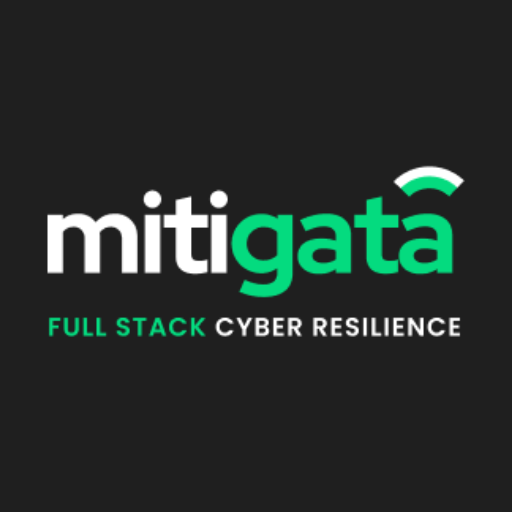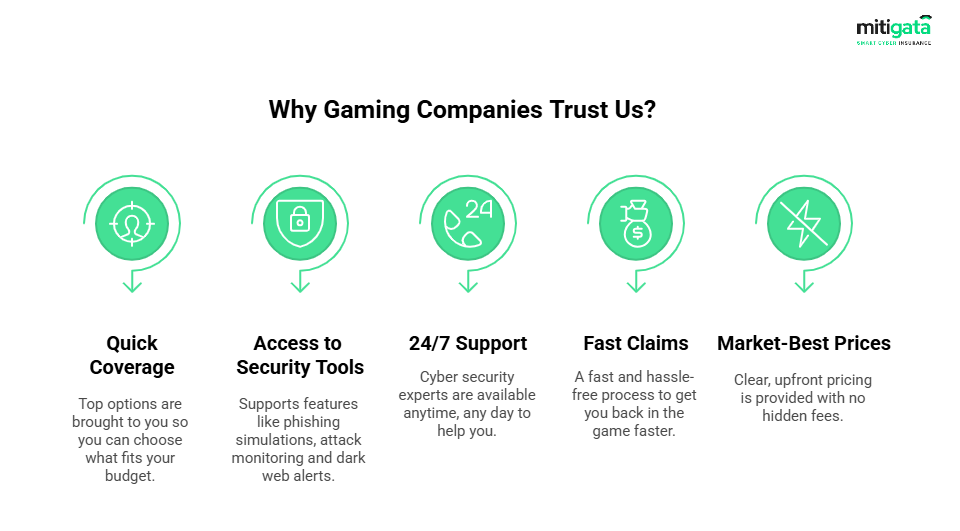What if I told you that some of the world’s most loved games – Minecraft, Roblox, GTA, and Call of Duty are prime hunting grounds for cybercriminals?
Minecraft alone saw more than 130,000 players hit by threats. And that’s just one game. According to Kaspersky’s 2024 report, nearly 11 million stolen gaming accounts were identified, out of which 84,000 were from India.
Given India’s current status as the world’s second-most targeted nation, this isn’t a surprise.
These games aren’t just entertainment anymore, they represent global communities with massive audiences, unlimited playtime, and growing digital economies.
Akamai reported a 94% jump in web attacks against games from Q1 2023 to Q1 2024, with bot traffic in the gaming sector nearly quadrupling in the same period.
Without cyber insurance, the financial hit on this sector can be crushing. This could lead to huge data breaches, lawsuits, and reputational damage.
Mitigata Your Leading Gaming Cyber Insurance Partner
You’ve got servers, communities, player accounts, and endless data to protect. But if you’re relying on “luck” instead of a proper shield, you’re already one hit away from game over.
Think of Mitigata as your teammate in co-op mode – the one who’s got your back when cyber villains show up.
Cyber Insurance for Gaming Firms Starts at Just ₹95,000/year*

With us, you don’t just get cyber insurance tailored for gaming businesses; you also get exclusive access to tools that help you detect, fight, and recover from attacks faster than you’d expect.
Our powerful cyber insurance policy for gaming companies usually covers:
Data Breach Costs
When important details of the player, such as emails, passwords, or credit card information, are taken, organisations need to act quickly. Insurance covers the costs of investigating the incident, notifying impacted gamers, and providing credit monitoring services.
For example, following a 2023 breach that exposed thousands of Steam accounts, firms were forced to spend extensively on forensic investigations and player assistance.
Business Interruption Losses
If servers go down after a cyberattack, revenue takes a direct hit. Cyber insurance helps cover the income lost during downtime.
Imagine a popular multiplayer game losing access during a holiday weekend. The sales and in-game purchases missed during those hours could mean millions in losses.
Learn more about the differences between CI coverage and Business Interruption Coverage
Cyber Extortion
Ransomware attacks are common in the gaming industry due to its reliance on continuous uptime. Insurance can cover ransom payments (where legally allowed) and fund the expert support needed to respond. In some cases, it also pays for negotiations with attackers and secure restoration.
Data Restoration
Hackers often corrupt or delete game files, user databases, or development code. Insurance provides resources to recover or restore lost data so operations return to normal more quickly. This can mean getting an online game back up before players migrate to competitors.
Looking to buy cyber insurance? Check out our expertly curated list of top cyber insurance companies in India.
Regulatory Penalties
Gaming platforms operate globally and face strict laws on data privacy. A breach that affects European players may trigger GDPR fines, while US states like California impose their own penalties. Cyber insurance helps cover these fines and compliance costs.
Legal Costs
If players sue after their accounts or financial details are stolen, legal bills rise quickly. Cyber insurance covers legal defense fees, settlements, or court awards. For example, a class-action lawsuit could easily cost more than the breach itself.
Identity Theft Support
Stolen gaming accounts are often resold on dark web forums. If player identities are misused for fraud, insurance offers support such as credit monitoring and fraud assistance for affected customers. This not only helps players but also reduces the damage to your reputation.
Reputation Management
A cyberattack can shake player trust overnight. Insurance often includes public relations support to manage communication and repair brand image. Timely and transparent updates can help reassure the gaming community and prevent long-term damage.
Unlock Ultimate Cyber Defense for Your Company

Common Cyber Risks Faced by Gaming Companies
You know if you want to defend your game, you need to understand your opposition threat actors. Here’s a look at some of the most common cyber risks that can disrupt the gaming industry.
Data Breaches and Intellectual Property Theft
Hackers usually target player accounts, payment details, or even game source code. A single breach can leak millions of records. In 2024, reports showed over 11 million gaming account credentials were stolen. For a company, this means legal trouble, lost revenue, and broken player trust.
Distributed Denial-of-Service (DDoS) Attacks
A DDoS attack overwhelms your servers until they go down, leaving players stuck and your reputation on the line. In esports, minutes of downtime can wreck live matches and cost sponsorships.
Account Takeovers (ATOs)
Player accounts are valuable on the black market, so hackers often steal login details and resell them. Popular games like Fortnite and Minecraft often see players losing access to accounts they spent years building. Companies end up dealing with angry customers and brand damage.
Did you know it is predicted that cybercrime losses in India are going to reach $200 billion in 2025. Learn more about cyber insurance and why it’s getting popular in India
Malware-Infected Downloads
It has been reported many times that players looking for cheat codes often download infected files. Once installed, malware can steal data or damage systems. Companies face backlash if users blame the official game for what started with an unofficial download.
Ransomware
Hackers lock company data and demand a payout to unlock it. For gaming firms, that could mean dead servers, lost code, and players stuck outside their accounts. Paying doesn’t always bring data back, but refusing can leave systems down for weeks.
Wanna know how you can choose the Best Patch Management Software for your business? Read this.
Phishing and Social Engineering
Hackers trick employees or players into handing over sensitive information. A fake login page that looks like a real gaming platform can easily trap unsuspecting players. For a company, a single staff member clicking a malicious email can open the doors to a larger breach.
Vulnerabilities in Game Development and Supply Chain
Gaming companies rely on third-party vendors for payment systems, chat features, and even in-game purchases.
If one of those vendors has weak security, attackers can use that as a backdoor into the company’s systems. In recent years, supply chain breaches have been among the most damaging attacks across industries.
Why Cyber Insurance Is Essential for Gaming Companies
Let’s look at this example of the 2021 ransomware attack on CD Projekt Red. Hackers broke into their network, encrypted devices, and stole critical source code of major games, including Cyberpunk 2077, The Witcher 3, Gwent, and even the unreleased Witcher build.
The company refused to pay, but the fallout was heavy: their stock price tanked, employee data leaked, and stolen code began surfacing online.
Cyber insurance protects you in moments like these. It helps cover legal fees, ransom demands, and downtime losses.
For smaller studios, it can be the line between survival and closure. For major publishers, it protects reputation while systems get back online.
The gaming industry isn’t slowing down, and neither are the attackers. Insurance doesn’t stop the attacks, but it makes sure you’re not left to clean up the mess alone.
Power-Up Your Cyber Protection At Just ₹95,000/Year*

Cost of Cyber Insurance for Gaming Companies
The price of cyber insurance for gaming businesses depends on factors like your company size, the type of data you handle, and your overall cyber risk profile.
A multinational publisher managing millions of active accounts will pay a higher premium than a mid-sized studio with a smaller user base.
One essential factor is the sensitivity of the data being stored. Companies with effective cybersecurity controls, such as multi-factor authentication, regular audits, and a 24/7 SOC, could pay lower premiums than those with weaker defences.
Another element that shapes pricing is claims history. A past record of breaches almost always pushes premiums higher.
Breaches in the gaming sector often run into crores, with regulatory penalties, lawsuits, and downtime causing long-term financial damage. Hence, choose the insurance wisely, as your future depends on it, because it does.
Conclusion
With attacks rising 94% year over year in gaming, cyber insurance is your shield against the rising cyber threats. The companies that invest now will be the ones players trust tomorrow.
The real question is – are you ready?
At Mitigata, we’ve built cyber insurance made for gaming companies, with the coverage and support to keep your business safe.
Don’t wait for an attack. Protect your game and players now.

